- Home
- William Kowalski
Eddie's Bastard Page 39
Eddie's Bastard Read online
Page 39
“Listen, boy,” he said. “Have you thought about what you’re going to do after I’m gone?”
“You know what I’m going to do. I’m going to find my mother.”
“I mean in general. Like a career.”
“Writer.”
“What else?”
“What do you mean, what else?”
“I mean suppose you don’t get lucky right away. What are you going to do for money?”
“I can always get a job.”
“Yeah. But there’s jobs and then there’s jobs.”
“Like what?”
He sighed and decided to get to the point. “I want you to go to college,” he said.
“I don’t need to go to college.”
“Wrong. This isn’t the old days. Things are different now. A college degree is your only hope, unless you want to be poor all your life. You’re smart. Don’t make the same mistakes I made.”
“I have some money saved up.”
“You’ll get some from me, too,” he said. “But that won’t be enough. I took out a policy on myself right before I got sick. You’ll get most of it.”
“What about Mildred?”
“I’ve talked it over with her. She doesn’t need it like you will. She got some money from her husband, so she’ll be all right.”
“But what is she going to do?”
“Retire,” said Grandpa. “Take it easy. Move into that new home they built over in Forestville, where they wait on you hand and foot and you play checkers all day.”
“Will she like that?”
“Probably not,” said Grandpa. “Not at first.”
“After a while, though?”
“Well, she’s an old lady.”
“Meaning what?”
“Well, people get old,” he said. “And then they die.”
“She wants to die in a nursing home?”
“Nobody wants to die in a nursing home,” said Grandpa. “But she doesn’t have any people left.”
“What about her children?”
“You’ve heard her talk about them. They don’t write, they don’t call. She doesn’t even know where they are.”
“Because of her husband, though. It’s not her fault.”
“They blame her, too, for putting up with him.”
“What about the house?”
“This house? It’s yours, of course,” he said, shocked. “What did you think? It just disappears?”
“Mildred can stay here,” I said.
“Well, it’s your place to do with as you see fit,” said Grandpa. He was trying to appear indifferent, but I could see tears welling up in his eyes. He turned away so I wouldn’t see them. I pretended not to notice.
“I want her to,” I said. “She belongs here just as much as you or I.”
“That’s mighty nice of you, boy.”
I thought of Mildred wasting away little by little in an old folk’s home. It would kill her as surely as a bullet in the brain, I thought. She needed activity to keep her going, things to occupy her mind, things to clean, things to worry about. She might be lonely in the big old house, but she wasn’t a recluse, like Grandpa. She would make friends. She was that kind of woman.
“She’s the closest thing to a mother I’ve ever had,” I said. Hardly were those words out of my mouth when their full import struck me. I put my face in my hands.
“Aw, shoot,” Grandpa said, and now it was his turn to pretend not to notice my tears. “Sometimes I hate the way things turned out for you, boy. It wasn’t fair, none of it. You got the raw end of the stick. Especially with me around.”
“Don’t say that,” I said. “You did fine.”
“I shoulda quit drinking years ago. When I got you. When I think of all the time I wasted—”
“Stop it,” I said. “I don’t blame you.”
“I’ll never forget that day,” he said. “Comin’ out on the back porch like that, and that jet goin’ over all of a sudden. Did I tell you about that jet?”
“You told me,” I said, remembering how the F–4 had roared overhead just as Grandpa was about to step on me. He’d told me the story a hundred times.
“I never was so happy since the day I got back from the war. I knew you right away. It was like I recognized you. Like I’d known you before. I hated to think what would happen if I died and that was the last of us. Papa Willie and my mother had such high hopes for me. You know? Well, that all went to hell. Sometimes I think I shouldn’t have let Eddie go to Vietnam, but there was really nothing I could have done about it. He was born to die young. I see it now. I see the whole picture. Anyway, boy, I’m glad you came along. That’s why I want you to go to college. I don’t care if you’re rich, or famous, or anything like that. I just want you to live a good life. Full. Happy.” He closed his eyes.
I was suddenly alarmed. “Hey,” I said.
“I’m not dead yet,” he said, his eyes still closed. “I’m just taking a nap.”
I went into my room. Not knowing what else to do, I got out a fresh notebook and wrote down the words he’d just said to me as exactly as I could. Someday, I knew, I would reread them, and perhaps their meaning would change for me over time. But for now I was too full of everything to absorb them.
I went downstairs to the kitchen and put the kettle on the stove for some coffee. Mildred appeared from the yard, where she’d been looking over her garden.
She was short of breath, startled. Without a word she sat down opposite me at the kitchen table.
“What’s the matter?” I asked.
“There’s a man in the grotto,” she said.
“A what?” I sprang to my feet.
The grotto was a small sunken area at the rear of the yard. Some long-gone Mann had dug it out. It was a sort of tiny amphitheater, no more than ten or twelve feet long, with a small bench in it facing a statue of the Virgin Mary. I ran to the kitchen window and peered out at the grotto. I could see a small form sitting hunched on the bench. It was a man, all right, albeit a very little one. For a moment I flashed back to my days of Munchkin-hunting, and a skein of the old panic was drawn through me, intertwined with a thread of fancy. Was it possible, I wondered, that the Munchkins were dying too, and that this was the last of their clan, come to make his peace with me before he passed on? It would make sense; for with Grandpa’s departure imminent, other parts of the world would be folding in on themselves, disappearing forever, the Munchkins among them.
But I was no longer young enough to believe in such things. It was a human. He appeared to be either asleep or deep in thought.
“A man in the grotto,” Mildred repeated, but I was already out the door and running across the yard.
He was smaller than I’d imagined, somehow. In the stories Grandpa had told me of him, he’d come to be larger than life, but now that he was here, he resumed his normal size. He couldn’t have been more than five feet tall. I crossed the yard and stopped behind him. After a lifetime of preparing for this moment, I was tongue-tied and confused. I looked at the little man curiously from the back. He wore a dark overcoat, with the collar turned up against the moist cool air of spring, and he was staring at the plaster Virgin with great curiosity. To him, I thought, Mary must appear like some foreign god, and he would wonder about her powers, be entranced by her strangeness. From behind he looked like a small boy wearing his father’s clothes. Suddenly he turned, alerted to my presence by my breathing.
“Ahh,” he said, his Oriental eyes folded in pleasure, his face dissolving into a thousand wrinkles. “And you are?”
“Billy,” I said.
He stood up from the bench and approached me slowly. Standing, he came only to the middle of my chest. My dream in Montreal had been accurate: he was a very old man. He moved at a catlike rate, without a trace of arthritis in his knees, but carefully, as though he was afraid of breaking himself. He stopped at a respectful distance and bowed as far as his eighty-five-year-old spine would permit.
“Pleasu
re to meet you,” he said. “Billy is short for William Amos Mann, I presume. Named after your great-great-grandfather.”
I bowed in return. It was the first time in my life I’d greeted someone in this fashion. Instinctively I knew that a man of this age, who had come so far to fulfill an obligation that lesser men would have discarded, deserved my complete and unfettered respect. I bowed as low as I could. When I straightened up, he was smiling even more broadly.
“For an American boy,” he said, “you are very polite. How nice.”
“Thank you,” I said, at a loss for further words. We stood looking at each other.
“Do you know who I am?” he inquired after a moment.
“Yes,” I said. “I’m sorry. Won’t you come in the house?”
“It’s very chilly out here,” he said. “I’m afraid I’m not as inured to the elements as I once was.”
We walked slowly toward the house. He held my elbow with one hand. The yard was swimming before my eyes, and the chill of desperation in my chest had been for the moment replaced by wild joy.
Enzo Fujimora had come to Mannville.
The truth was, as Enzo explained to me later, there was no great mystery to determining in advance the date of Grandpa’s death. Long ago, when he and Grandpa were living on the South Pacific island together, he had consulted a variety of signs to make his forecast, much as a farmer reads the wind to tell when the rain is coming. First, he read Grandpa’s palm; the lifeline was long, but intersected before its natural termination by misfortune, or perhaps illness. Second, he asked him for the precise date and time of his birth, and then correlated the information with his vast knowledge of Eastern astrology, which he had memorized even as long ago as 1943. Finally, he improvised three coins of wood, upon which he made markings to distinguish heads from tails. Grandpa threw the coins, Enzo tallied up the markings, and then he consulted the other vast work he had memorized, the ancient and mystical Chinese work called the I Ching. His pronouncement: Grandpa was probably going to die sometime between 1987 and 1990.
Of course, said Enzo, he said nothing of this to Grandpa at the time. It wasn’t right for a man to know in advance the date of his death.
“But how did you know it was now?” I asked in bewilderment. I was unwilling or unable to believe that he had made a lucky guess. The myth of my childhood had been that he would just know, and seeing him in the grotto had in a way not surprised me at all. I wouldn’t have been surprised if he’d appeared from the sky riding a dragon.
But his final means relied not on fortune-telling or wizardry, but modern technology.
“I called the hospital in Mannville last month,” Enzo said. “After I introduced myself as a healer, and told them I was hoping to encounter an old friend, who I thought might already be sick, they gave me information concerning your grandfather. They were not supposed to do that, of course, but I convinced them.”
“How?”
Enzo winked and said nothing. Privately, I was encouraged. Perhaps he still had at least one trick up his sleeve, one that allowed him to control the minds of others at great distances, and so the magic of the myth was not completely destroyed.
I brought Enzo into the house. Mildred was cowering in the kitchen, but when she saw him chatting familiarly with me and noticed how small he was, she relaxed. She too had heard the story of Grandpa’s South Sea sojourn many a time, and when I introduced Enzo Fujimora himself, she was greatly impressed although still somewhat distrustful.
“Orientals are so spooky,” she told me later, in almost a whisper. It was the only time I came close to losing my temper with her. I had to remember that Mildred came from a generation that had fought one war with Asians and sent its sons to fight a second. It wasn’t her fault. She’d been taught to believe they weren’t human.
Willie Mann addresses this issue:
It is much easier to kill someone when you don’t allow yourself to think they are human like you. I was continually amazed, whenever I saw a Southerner, to see that he had two legs, two arms, ten fingers and toes, et cetera, just as I did. I had been told that Rebs looked more like dogs than people, and that killing one was about as significant.
The first thing I did was take Enzo upstairs. I paused at the threshold of Grandpa’s room and tapped lightly on the door.
“Grandpa,” I said.
His eyelids flickered like two drunken butterflies. I could hear his breathing from across the room. “What is it,” he sighed.
“Are you too sick for visitors?”
“Yes.”
“Someone’s here.”
Grandpa was too weak to raise himself up on his pillow. He tried to see who was in the doorway behind me, but he wasn’t wearing his glasses.
“Who?”
I led Enzo to the bed. He sat down next to Grandpa and put one tiny old hand on his. Grandpa’s eyes grew wide and the ghost of a smile wreathed his cracked lips. “Enzo-san,” he said.
“Thomas-san,” said Enzo.
“You made it.”
“Yes.”
“I’m glad,” said Grandpa. “You could have just mailed it.”
“I made a promise,” said Enzo. “Besides, I’ve always wanted to see beautiful Mannville. The house, and the garden, and everything.”
Beautiful Mannville? I thought.
“I’m dying, Enzo,” said Grandpa.
Enzo smiled. It was a smile of deep compassion.
“I know, Tom,” he said.
The two old men stayed like that, one’s hand resting on top of the other’s. They said nothing further. They just rested.
I left them alone and went back downstairs to finish my coffee, which had grown cold. Mildred offered to heat it up for me.
“That’s Enzo,” I said.
Mildred said nothing. She poured my coffee into a saucepan and lit the burner.
“I ought to buy a microwave,” I said.
Mildred shuddered. “I wouldn’t have one of those things in my house,” she said pointedly. “They give you cancer.”
“You can heat up coffee in one minute with one of those,” I said. “Just think of it.” There were, in fact, a lot of things I wanted to buy. It had only been with the arrival of Mildred two years earlier that Grandpa had finally gotten rid of the old icebox and installed a modern electric refrigerator. “I want a television!” I said. “And a VCR. And video games. All the stuff that other people have.”
“I guess you have been pretty sheltered,” observed Mildred.
“Wouldn’t you at least like a dishwasher?” I asked her. “Don’t you get tired of doing the dishes by hand?”
Mildred said nothing, her eyes filling with tears, and she looked away. Then I remembered I hadn’t yet asked her to stay.
“I was talking with Grandpa about you,” I said.
“You were?”
“You know about his first wife, how she just left him one day?”
“I know.”
“Grandpa never trusted anybody after that. No woman, or man, or anybody.”
“I know,” she said again.
“You’ve earned a place here as much as I have,” I told her. “You’re the one who made Grandpa happy again, as much as that sort of thing is possible. Even his wife was never this good for him. You have to stay. Please. Don’t go to Forestville. Stay here.”
Mildred sat at the table and put her face in her apron. I sipped my coffee and pretended once again that I didn’t notice. There had been a lot of crying lately and I found it all very embarrassing. When her emotion subsided, she dried her eyes.
“Thank you,” she said simply. We sat together, sipping coffee and saying little else.
After half an hour had gone by I went upstairs again. Enzo was seated in a chair by Grandpa’s bedside. I waited outside the door for a minute. They remained silent, as though communing in some sort of secret way. When they became aware of my presence, Enzo turned and smiled again at me, and Grandpa beckoned with one long yellow finger. I entered timid
ly.
“He was just in time,” said Grandpa with an effort. I looked at his eyes, his color, listened to his breathing. His skin was growing translucent even as I watched him. Grandpa closed his eyes and his breathing faded until it was nearly inaudible.
I noticed for the first time the book that lay on his chest, his free hand resting on it as though it was a source of strength. It was an old book, bound in plain leather, with no inscription on it. I could smell it from where I stood. It smelled of leather, and old paper, and of mildew; its odor suddenly seemed to permeate the room. How odd, I thought, that a book should have a smell. I inhaled deeply. There were other scents mixed into it: some strange sort of spice, or perhaps wood smoke, and another smell that hinted of someone else’s house. It was a house far from Mannville, one that smelled nothing like any house around here.
Grandpa’s eyes fluttered open once more. He grasped the book with both hands and pushed it up toward me with tremendous effort. I took it from him before he could falter. He tried to speak, but his mouth and throat were too dry. I gave him a sip of water. He moistened his lips and tried again.
“Read it,” he said, after several tries. Then he closed his eyes for the last time.
Grandpa continued to breathe for three more hours. Enzo moved to one wall of the bedroom, out of the way, while I sat in his place and Mildred sat on the other side of the bed. We watched him until his breathing faded more and more into nothingness. At the last moment, Mildred and Enzo left the room and closed the door, and I was alone with him. I put his hand in mine and held it on the bed. At 3:43 P.M., his breathing finally stopped, the tiny pulse in his hand disappeared, and his skin began to grow cold.
I got up and opened the window. A flock of birds, disturbed by the noise, flew silently from their roosts and fluttered skyward. I leaned out of the window for several moments, looking out over the yard. Over the tops of the trees I could just see the roofs of the highest houses in the new subdivisions, sitting on what had once been Mann land. I meditated dully on them without really thinking.

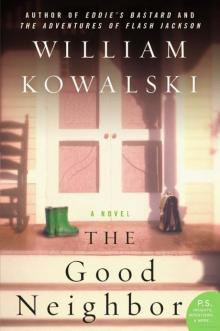 The Good Neighbor
The Good Neighbor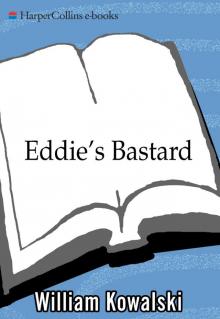 Eddie's Bastard
Eddie's Bastard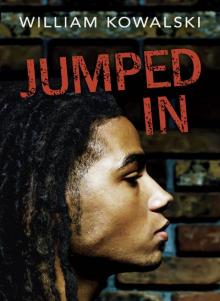 Jumped In
Jumped In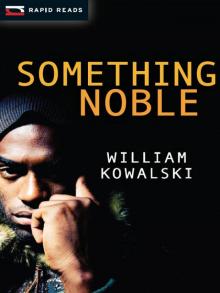 Something Noble
Something Noble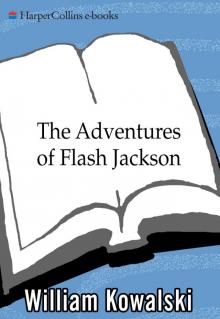 The Adventures of Flash Jackson
The Adventures of Flash Jackson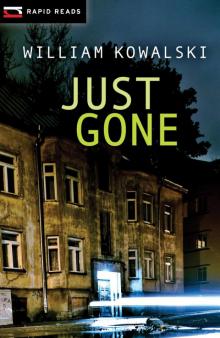 Just Gone
Just Gone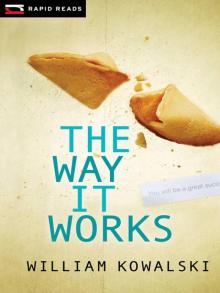 The Way It Works
The Way It Works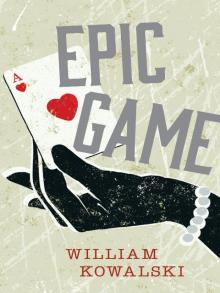 Epic Game
Epic Game